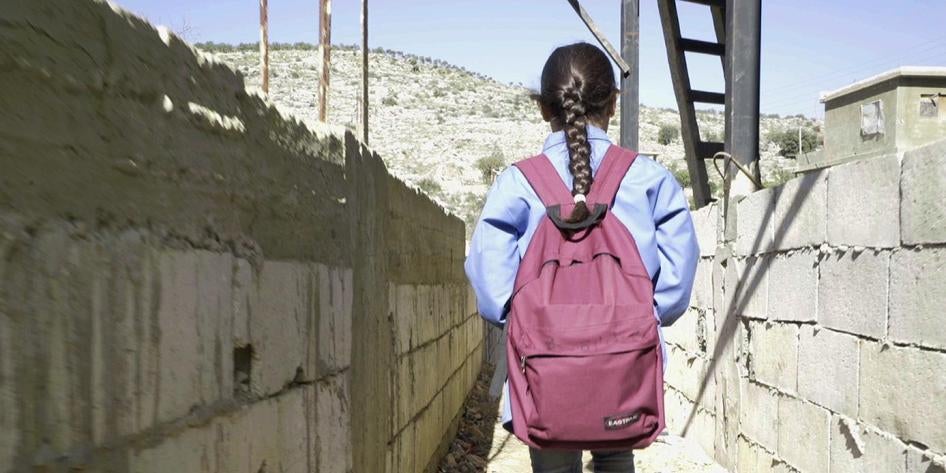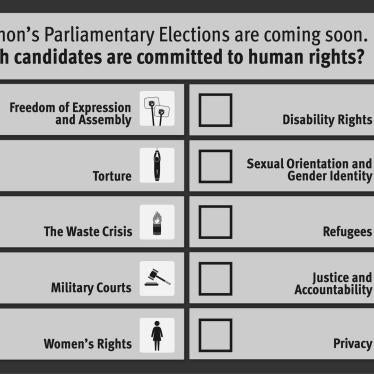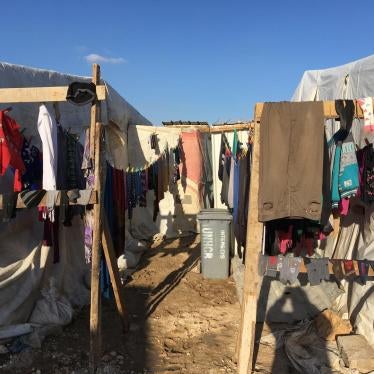At the Friends of Syria donor conference last week, donor countries pledged $4.4 billion in humanitarian support to Syria and neighboring refugee-hosting countries. Lebanon, with the highest per capita number of refugees in the world, simultaneously made important commitments to refugee rights, including on residency status, education, legal protection, and nonrefoulement. These could a have a real and positive impact on the lives of the estimated 1.5 million Syrians in Lebanon—if Lebanon keeps its promises.
Refugee Protection
Lebanon has a pattern of making pledges to improve harsh residency restrictions for Syrians but failing to follow through. At the London donor conference in 2016, Lebanon committed to a “review of existing regulatory frameworks related to residency conditions and work authorizations.” But two years later, an estimated 74 percent of refugees lack legal status and 76 percent live in poverty.
The lack of legal residency affects most aspects of refugees’ lives, limiting their ability to move freely and work to support families without fear of arrest, blocking access to education and healthcare, and contributing to child labor and early marriage. But prior steps on this issue have created an illusion of progress without solving the core issue.
In 2017 Lebanon waived an onerous US$200 annual residency fee for some Syrians. But the decision excluded the estimated 500,000 Syrians not registered with the UN refugee agency (UNHCR) and anyone who had relied on a Lebanese sponsor for legal status. And processing offices accepted a limited number of applications, diminishing the effect of the decision. Similarly, a March decision to facilitate legal residency for Syrians ages 15 to 18 was key to ensuring that older children can stay in school. But the decision excluded anyone who had already turned 19, and unnecessarily restricted the types of identity documents required.
In Brussels last week, Lebanon committed to ensuring that “all eligible refugees can renew their residency free of charge,” promising to expand the fee waiver to all refugees and to process more applications. The government should follow through on this commitment, and end its “one step forward, one step back” approach on this issue.
Education
Seven years and hundreds of millions of dollars into this crisis, an estimated 330,000 refugee children are out of school in Lebanon. Lebanon and the international community in Brussels recommitted to the ongoing Reaching All Children with Education plan (RACE 2). But that plan aims to enroll just 250,000 children in school by 2021 (and just 5,000 in secondary education) out of an estimated 630,000 school-age children. Commitments to address barriers to education, quality, and monitoring are more promising but will need to be carried out. Lebanese schools also routinely discriminate against children with disabilities, which the conference report doesn’t address, but the government should.
Returns
With the issue of returns to Syria dominating political discussions, it is important that Lebanon also committed to the “safe, dignified and non-coercive return” of refugees in accordance with the principle of nonrefoulement. Over the past year, Lebanese politicians have increasingly called for the return of refugees, claiming that many areas are safe. They ignore the volatile nature of the war, and many Syrians’ well-founded fears of persecution at the hands of the Syrian government even where fighting has ended. Two weeks ago, Lebanon’s Foreign Ministry summoned the UNHCR country representative after the agency put out a neutral statement saying it was not involved in the returns of 500 refugees to Syria. Local media reported that the government demanded UNHCR refrain from statements on returns, undermining the refugee agency’s core protection mandate. And just yesterday, President Aoun reportedly said he would seek a refugee “solution” without the UN, days after calling on the United Arab Emirates, Saudi Arabia, and Egypt to help facilitate refugee returns.
Evictions and violations at the local level
Donor support is crucial, but Lebanon in turn needs to demonstrate that it is willing to protect refugee rights. The central government has stood by as individual municipalities have committed a range of abuses including discriminatory curfews and mass evictions of Syrians. Since 2016, 13 municipalities have forcibly expelled more than 3,600 Syrians without due process or legal basis. Another 42,000 are at risk of eviction. A commitment in Brussels to “supporting and upholding the rule of law” is a good first step, but Lebanese authorities need to show that they are willing to enforce refugee rights at the local level.
Ongoing gaps
Despite some positive steps in Brussels, funding commitments fell short of expectations by $1.6 billion, largely because the United States failed to pledge any support, and was nearly $5 billion short of what the UN said it needed to fund the humanitarian response. The international community also failed to announce higher targets for refugee resettlement, with larger and wealthier countries continuing to abdicate their responsibility to take in more of the refugees themselves. Lebanon for its part made no commitments on livelihoods for refugees despite barriers to work permits and informal work that have made it very difficult for Syrians to support their families. Donors should step up with additional funding and resettlement throughout the year, but in the meantime Lebanon can start by keeping the commitments it made in Brussels.










